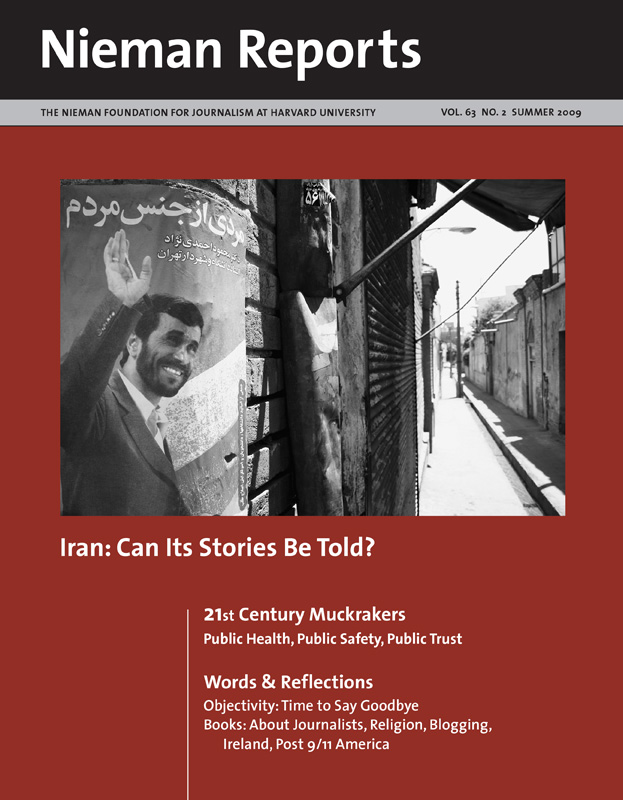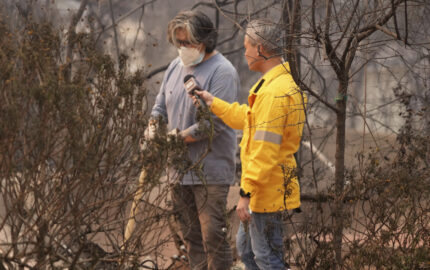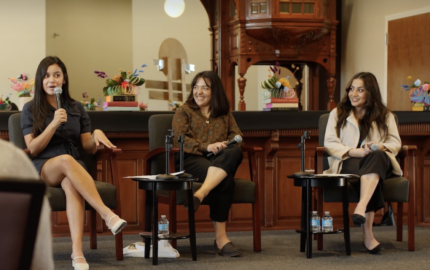
Iran: Can Its Stories Be Told?
Journalists — Iranians and Westerners — share their firsthand experiences as they write about the challenges they confront in gathering and distributing news and information about Iran and its people. Their words and images offer a rare blend of insights about journalists’ lives and work in Iran. In the fifth part of our 21st Century Muckrakers series about investigative and watchdog reporting, the focus turns to coverage of issues involving public health, safety and trust. And in Words & Reflections, essays touch on objectivity, religion, blogging, Ireland and post 9/11 America.
It might be argued that “Dirty Secrets, Dirty War: The Exile of Editor Robert J. Cox” should have been written three decades ago, most likely in 1981, when Cox was enjoying, as I do now, a Nieman Fellowship. He was then on his second year of exile, the bitter prize he had been awarded for making the English-language newspaper Buenos Aires Herald into one of the main advocates against state terrorism in Argentina.
The military junta was still in power, backed by the Reagan administration, and Latin American politics were a matter of public concern for a broad U.S. audience. Robert Cox’s book would have come out as a powerful indictment against the human rights violations taking place in Argentina at the time.
But he could not write this book then, neither can he today. “I have always believed in impersonal journalism, the reporter in a shabby raincoat that nobody notices who writes his stories without a byline,” he explains in the prologue to “Dirty Secrets, Dirty War.” Modesty, he concedes, was only one reason; it was too painful a story for him to write.1
Twenty-eight years later, with Buenos Aires now a favorite American expat destination, the past Argentinean tragedy awakens little interest in a country that’s beginning to come to terms with its own government’s human rights violations in the “war against terrorism.” But it is now when Cox’s son David, at last conquering his own arduous distance from the country in which he was born and raised, writes the book his father couldn’t write. Significantly, he does it in the year in which his father, 75 years of age, retired from journalism.
Is this story being told too late? Or is the ordeal of a man who saw horror when most people around him were in denial still an important one to tell?
Cox’s Time and Place
In 1959, at 26, seeking to escape a dull middle-class existence in his native England, Cox answered a classified advertisement for a newspaper job in Buenos Aires. The Buenos Aires Herald, founded by a Scotsman in 1876 as a shipping news single sheet, was, 83 years later, a small daily newspaper for the equally small English-language Argentinean community. Cox said goodbye to his homeland and boarded a ship that traversed the Atlantic toward a life of adventure and exoticism.
He got much more than that. After two years as a reporter at the Herald, he was promoted to news editor and soon afterwards he married Maud Daverio, an Anglo-Argentine whose prosperous family claimed an aristocratic British lineage. Cox’s Argentina was quite different from that of most Argentinean journalists. Bob and Maud lived in a wealthy, Parisian-like neighborhood, owned a weekend villa in an exclusive country club, sent their five children to an elite English school, and spent their vacations in Europe. Cox entered a fraction of the Argentine society that was, for the most part, fiercely anti-Peronist (mostly for class reasons, Peronism being the party with which the working class identified), pro-military (several members of Maud’s family were officers), politically conservative and, in many cases—to Cox’s shock—anti-Semitic.
In the late 1960’s and early 1970’s, when Argentina’s working and middle classes radicalized, Cox opposed the guerrilla movements (“terrorism” in his nomenclature) and the political left. He received death threats by Montoneros, the Peronist guerrilla, and was viewed “as a right-wing imperialist by the left,” as he puts it. When in 1976 a new military dictatorship overthrew a democratically elected government and took power with the stated purpose of crushing the “subversive elements” in the country, Cox, by then editor of the Herald, almost applauded.
The Herald supported the military junta and its first leader, General Jorge R. Videla, as did the majority of the press. Cox had good contacts in the armed forces and met often with high-ranking government officials. He supported the economic plan and had a dear friend who was appointed finance director at the Ministry of Economy.
Almost everyone Cox knew and loved saw the dictatorship as a way out from one of Argentina’s darker periods. It would be, at last, an end to Peronism and its evils; it would transform the economic structure of the country and put an end to the political violence originated, as they saw it, in the “terrorism” of the left and the internal feuds of the Peronist party.
But Cox soon realized that something very different was taking place. In cocktail parties, in conversations with military sources, in calls from the Herald’s readers, he started to hear about people being kidnapped and “disappeared.” The first confirmation came from an English expatriate couple whose son had been abducted by a squad of policemen in the middle of the night and later found dead with signs of having been tortured. Far-right factions within the government, he concluded, had adopted the methods of the left-wing “terrorists.” It had become, he deplored, “another terrorism.”
While praising the economic plan and other aspects of the military administration, the Herald published front-page stories about the disappearances. Those articles saved lives: several people “reappeared.” It was a courageous decision, and the Herald was mostly alone among Argentinean publications. The government had issued strict censorship rules, and reporters and editors were among the detainees and disappeared.
Herald News Editor Andrew Graham-Yool came up with the idea of having the relatives of the disappeared secure habeas corpus writs so that the reports of kidnappings would have an official source. Only one other Argentinean newspaper, La Opinión, followed the Herald in publishing the habeas corpus writs.
As a frequent stringer for American newspapers such as The Washington Post, Cox wrote the first stories about the gatherings of the relatives of the disappeared in front of the Government House. The Mothers of the Plaza de Mayo and, later, the Grandmothers of the Plaza de Mayo, would become worldwide symbols of the fight against state terrorism as they gathered in crowds to clamor for the truth about their children’s whereabouts.
The Herald’s newsroom became a meeting point for the relatives of the victims—the only newsroom in which they were welcomed. A few other newspapers occasionally agreed to run lists with the names of the disappeared under the form of “solicitadas,” paid ads. But Cox refused to take money from the relatives. The Herald also became the most reliable source of information about human rights violations in Argentina. It reached a circulation of 20,000 and gained international prestige. Argentines found in it what they couldn’t find in their Spanish-language publications.
The Story’s Personal Toll
Most journalists in Argentina know Cox’s record. What not everyone knows is the price he and his family paid. David Cox tells of his father’s severe asthma seizures. With threats mounting against him and his family—Robert Cox was detained for 24 hours and faced the prospect of his own disappearance—his children “alternated their route home from school to the apartment, sometimes taking the train and other times riding the bus.” He also became isolated from friends and people whom they thought were friends. To many in his own social circle, he’d become a “subversive Communist.”
In June 1979, Cox lamented that, “People treat me, I imagine, in the same way they would treat a condemned man.” He designed mental escape plans from his home and from the newsroom in case they came looking for him. He’d wake up in the middle of the night fearing someone had entered their house and, when he went to check on his children to be sure they were all right, found them awake and alert.
After three long years of living in fear, his son Peter, an elementary school student, received a threatening letter: It carried personal information that only someone close to the family would know. (Years later, they would learn that the informer was a cousin of Maud’s who served in the Navy.) The letter stated that the family had the “option” of seeking exile or they would be “assassinated.”
Cox asked General Videla for protection. When Videla argued he couldn’t guarantee his own security, Cox decided to go into exile. Bit by bit he came to realize that it was not a fraction of the military involved in state terrorism, but the entire government. From the United States, Cox continued to be an outspoken critic of these human rights violations until in 1983 democracy was restored in Argentina.
It took years for the press, which had praised the dictatorship and omitted coverage of most of its crimes, to regain public credibility. But the Herald was never again such a fine newspaper. Last year, after a long financial struggle, the U.S.-owned Evening Post Publishing Co. sold it to an Argentinean entrepreneur of dubious reputation. At about the same time, Cox retired as assistant editor for The (Charleston) Post and Courier of South Carolina.
Once or twice a year, Cox goes back to Buenos Aires, where he keeps an apartment. I met him there a few times at afternoon tea parties he organizes to catch up with his Argentine friends and acquaintances. He draws an odd, diverse crowd: Anglo-Argentines, high-society ladies, human rights advocates, a few young journalists. I first attended one of these gatherings while researching the life of Jacobo Timerman, a legendary Argentine newspaperman of his generation. Many journalists whom I interviewed at the time argued I needed to understand “the context” in which they had lived; understanding that, they implied, their silence would be justified. Cox was the living refutation of that argument: He was able to escape his context.
That rarity speaks to the importance of Cox’s story. And today, when the ideals of journalistic truth risk becoming old fashioned and a “war against terrorism” with government sponsored torture and disappearances has again been waged, it is as important as it was three decades ago.
Graciela Mochkofsky, a 2009 Nieman Fellow, has been a journalist in Argentina for the past 17 years, as senior political correspondent for La Nación and until last year as a contributing political columnist for the newspaper Perfil, in Buenos Aires. Her articles have appeared in many Latin American newspapers and magazines, and she has written four nonfiction books; her most recent book, La Revelación, was published in August 2007.
The military junta was still in power, backed by the Reagan administration, and Latin American politics were a matter of public concern for a broad U.S. audience. Robert Cox’s book would have come out as a powerful indictment against the human rights violations taking place in Argentina at the time.
But he could not write this book then, neither can he today. “I have always believed in impersonal journalism, the reporter in a shabby raincoat that nobody notices who writes his stories without a byline,” he explains in the prologue to “Dirty Secrets, Dirty War.” Modesty, he concedes, was only one reason; it was too painful a story for him to write.1
Twenty-eight years later, with Buenos Aires now a favorite American expat destination, the past Argentinean tragedy awakens little interest in a country that’s beginning to come to terms with its own government’s human rights violations in the “war against terrorism.” But it is now when Cox’s son David, at last conquering his own arduous distance from the country in which he was born and raised, writes the book his father couldn’t write. Significantly, he does it in the year in which his father, 75 years of age, retired from journalism.
Is this story being told too late? Or is the ordeal of a man who saw horror when most people around him were in denial still an important one to tell?
Cox’s Time and Place
In 1959, at 26, seeking to escape a dull middle-class existence in his native England, Cox answered a classified advertisement for a newspaper job in Buenos Aires. The Buenos Aires Herald, founded by a Scotsman in 1876 as a shipping news single sheet, was, 83 years later, a small daily newspaper for the equally small English-language Argentinean community. Cox said goodbye to his homeland and boarded a ship that traversed the Atlantic toward a life of adventure and exoticism.
He got much more than that. After two years as a reporter at the Herald, he was promoted to news editor and soon afterwards he married Maud Daverio, an Anglo-Argentine whose prosperous family claimed an aristocratic British lineage. Cox’s Argentina was quite different from that of most Argentinean journalists. Bob and Maud lived in a wealthy, Parisian-like neighborhood, owned a weekend villa in an exclusive country club, sent their five children to an elite English school, and spent their vacations in Europe. Cox entered a fraction of the Argentine society that was, for the most part, fiercely anti-Peronist (mostly for class reasons, Peronism being the party with which the working class identified), pro-military (several members of Maud’s family were officers), politically conservative and, in many cases—to Cox’s shock—anti-Semitic.
In the late 1960’s and early 1970’s, when Argentina’s working and middle classes radicalized, Cox opposed the guerrilla movements (“terrorism” in his nomenclature) and the political left. He received death threats by Montoneros, the Peronist guerrilla, and was viewed “as a right-wing imperialist by the left,” as he puts it. When in 1976 a new military dictatorship overthrew a democratically elected government and took power with the stated purpose of crushing the “subversive elements” in the country, Cox, by then editor of the Herald, almost applauded.
The Herald supported the military junta and its first leader, General Jorge R. Videla, as did the majority of the press. Cox had good contacts in the armed forces and met often with high-ranking government officials. He supported the economic plan and had a dear friend who was appointed finance director at the Ministry of Economy.
Almost everyone Cox knew and loved saw the dictatorship as a way out from one of Argentina’s darker periods. It would be, at last, an end to Peronism and its evils; it would transform the economic structure of the country and put an end to the political violence originated, as they saw it, in the “terrorism” of the left and the internal feuds of the Peronist party.
But Cox soon realized that something very different was taking place. In cocktail parties, in conversations with military sources, in calls from the Herald’s readers, he started to hear about people being kidnapped and “disappeared.” The first confirmation came from an English expatriate couple whose son had been abducted by a squad of policemen in the middle of the night and later found dead with signs of having been tortured. Far-right factions within the government, he concluded, had adopted the methods of the left-wing “terrorists.” It had become, he deplored, “another terrorism.”
While praising the economic plan and other aspects of the military administration, the Herald published front-page stories about the disappearances. Those articles saved lives: several people “reappeared.” It was a courageous decision, and the Herald was mostly alone among Argentinean publications. The government had issued strict censorship rules, and reporters and editors were among the detainees and disappeared.
Herald News Editor Andrew Graham-Yool came up with the idea of having the relatives of the disappeared secure habeas corpus writs so that the reports of kidnappings would have an official source. Only one other Argentinean newspaper, La Opinión, followed the Herald in publishing the habeas corpus writs.
As a frequent stringer for American newspapers such as The Washington Post, Cox wrote the first stories about the gatherings of the relatives of the disappeared in front of the Government House. The Mothers of the Plaza de Mayo and, later, the Grandmothers of the Plaza de Mayo, would become worldwide symbols of the fight against state terrorism as they gathered in crowds to clamor for the truth about their children’s whereabouts.
The Herald’s newsroom became a meeting point for the relatives of the victims—the only newsroom in which they were welcomed. A few other newspapers occasionally agreed to run lists with the names of the disappeared under the form of “solicitadas,” paid ads. But Cox refused to take money from the relatives. The Herald also became the most reliable source of information about human rights violations in Argentina. It reached a circulation of 20,000 and gained international prestige. Argentines found in it what they couldn’t find in their Spanish-language publications.
The Story’s Personal Toll
Most journalists in Argentina know Cox’s record. What not everyone knows is the price he and his family paid. David Cox tells of his father’s severe asthma seizures. With threats mounting against him and his family—Robert Cox was detained for 24 hours and faced the prospect of his own disappearance—his children “alternated their route home from school to the apartment, sometimes taking the train and other times riding the bus.” He also became isolated from friends and people whom they thought were friends. To many in his own social circle, he’d become a “subversive Communist.”
In June 1979, Cox lamented that, “People treat me, I imagine, in the same way they would treat a condemned man.” He designed mental escape plans from his home and from the newsroom in case they came looking for him. He’d wake up in the middle of the night fearing someone had entered their house and, when he went to check on his children to be sure they were all right, found them awake and alert.
After three long years of living in fear, his son Peter, an elementary school student, received a threatening letter: It carried personal information that only someone close to the family would know. (Years later, they would learn that the informer was a cousin of Maud’s who served in the Navy.) The letter stated that the family had the “option” of seeking exile or they would be “assassinated.”
Cox asked General Videla for protection. When Videla argued he couldn’t guarantee his own security, Cox decided to go into exile. Bit by bit he came to realize that it was not a fraction of the military involved in state terrorism, but the entire government. From the United States, Cox continued to be an outspoken critic of these human rights violations until in 1983 democracy was restored in Argentina.
It took years for the press, which had praised the dictatorship and omitted coverage of most of its crimes, to regain public credibility. But the Herald was never again such a fine newspaper. Last year, after a long financial struggle, the U.S.-owned Evening Post Publishing Co. sold it to an Argentinean entrepreneur of dubious reputation. At about the same time, Cox retired as assistant editor for The (Charleston) Post and Courier of South Carolina.
Once or twice a year, Cox goes back to Buenos Aires, where he keeps an apartment. I met him there a few times at afternoon tea parties he organizes to catch up with his Argentine friends and acquaintances. He draws an odd, diverse crowd: Anglo-Argentines, high-society ladies, human rights advocates, a few young journalists. I first attended one of these gatherings while researching the life of Jacobo Timerman, a legendary Argentine newspaperman of his generation. Many journalists whom I interviewed at the time argued I needed to understand “the context” in which they had lived; understanding that, they implied, their silence would be justified. Cox was the living refutation of that argument: He was able to escape his context.
That rarity speaks to the importance of Cox’s story. And today, when the ideals of journalistic truth risk becoming old fashioned and a “war against terrorism” with government sponsored torture and disappearances has again been waged, it is as important as it was three decades ago.
Graciela Mochkofsky, a 2009 Nieman Fellow, has been a journalist in Argentina for the past 17 years, as senior political correspondent for La Nación and until last year as a contributing political columnist for the newspaper Perfil, in Buenos Aires. Her articles have appeared in many Latin American newspapers and magazines, and she has written four nonfiction books; her most recent book, La Revelación, was published in August 2007.
 Dirty Secrets, Dirty War: The Exile of Editor Robert J. Cox
Dirty Secrets, Dirty War: The Exile of Editor Robert J. Cox

